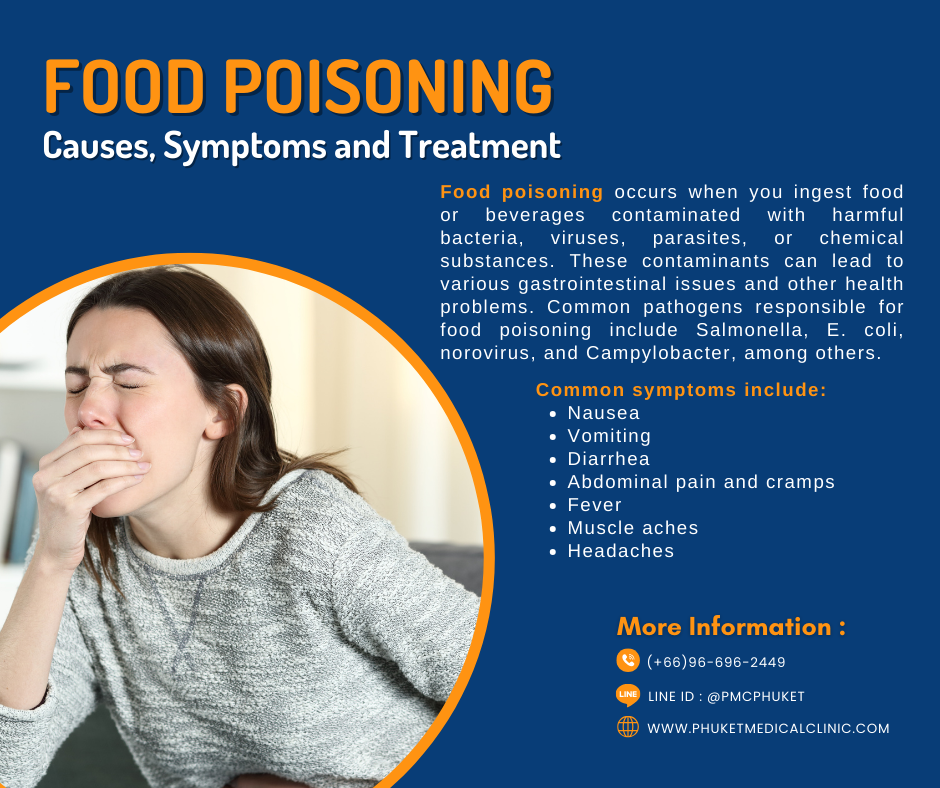Food poisoning is a common and potentially dangerous condition caused by consuming contaminated or improperly prepared food. It can lead to a range of symptoms, from mild stomach discomfort to severe illness, and in some cases, it can even be life-threatening. In this article, we will explore the causes of food poisoning, its symptoms, and most importantly, how you can prevent it through proper food safety practices.
What is Food Poisoning
Food poisoning occurs when you ingest food or beverages contaminated with harmful bacteria, viruses, parasites, or chemical substances. These contaminants can lead to various gastrointestinal issues and other health problems. Common pathogens responsible for food poisoning include Salmonella, E. coli, norovirus, and Campylobacter, among others.
Causes of Food Poisoning
- Bacterial Contamination: Bacteria like Salmonella, E. coli, and Campylobacter are common culprits of food poisoning. They thrive in undercooked meat, poultry, and dairy products.
- Viral Infections: Viruses such as norovirus and hepatitis A can contaminate food, particularly if it is handled by infected individuals.
- Parasitic Infections: Parasites like Giardia and Cryptosporidium can be present in contaminated water or undercooked food.
- Toxins: Toxins produced by certain bacteria, such as Clostridium botulinum, can be present in improperly canned or preserved foods.
- Cross-Contamination: When food comes into contact with surfaces, utensils, or hands contaminated with pathogens, it can become unsafe to eat.

Symptoms of Food Poisoning
Food poisoning can manifest with a range of symptoms, which typically appear within hours to days after consuming contaminated food. Some common symptoms include:
- Nausea
- Vomiting
- Diarrhea
- Abdominal pain and cramps
- Fever
- Muscle aches
- Headaches
While most cases of food poisoning are mild and resolve on their own, some individuals, such as the very young, the elderly, and those with weakened immune systems, are more susceptible to severe complications. It’s important to seek medical attention if symptoms are severe or persistent.
Treatment of Food Poisoning
Treatment for food poisoning depends on how severe your symptoms are and what caused the illness. In most cases, drug treatment isn’t necessary.
Treatment may include the following:
- Fluid replacement: Fluids and electrolytes maintain the balance of fluids in your body. Electrolytes include minerals such as sodium, potassium and calcium. After vomiting or diarrhea, it’s important to replace fluids to prevent dehydration. Severe dehydration may require going to the hospital. You may need fluids and electrolytes delivered directly into the bloodstream.
- Antibiotics: Symptoms of Food PoisoningIf the illness is caused by bacteria, you may be prescribed an antibiotic. Antibiotics are generally for people with severe disease or with a higher risk of complications.
- Antiparasitics: Drugs that target parasites, called antiparasitics, are usually prescribed for parasitic infections.
- Probiotics: Your care provider may recommend probiotics. These are treatments that replace healthy bacteria in the digestive system.
Preventing Food Poisoning
Preventing food poisoning is largely a matter of practicing good food safety at all stages of food preparation, handling, and storage. Here are some essential tips to help reduce the risk of food poisoning:
- Wash Hands: Always wash your hands thoroughly with soap and water before and after handling food.
- Clean Surfaces: Keep kitchen surfaces and utensils clean to prevent cross-contamination.
- Cook Food Properly: Use a food thermometer to ensure that meat, poultry, and seafood are cooked to safe internal temperatures.
- Avoid Cross-Contamination: Store raw meats separately from other foods in the refrigerator and use different cutting boards for meats and vegetables.
- Refrigeration: Refrigerate perishable foods promptly and keep your fridge at or below 40°F (4°C).
- Hygiene: Ensure personal hygiene, such as regularly trimming and cleaning nails, is maintained.
- Avoid Raw Eggs: Be cautious when consuming raw or undercooked eggs, as they can contain harmful bacteria.
- Wash Produce: Thoroughly wash fruits and vegetables under running water, especially if you plan to eat them raw.
- Leftovers: Consume leftovers within a safe time frame, and reheat them to an appropriate temperature.
- Stay Informed: Stay informed about food recalls and avoid products that have been recalled due to contamination.
Food poisoning is a preventable health concern that can be avoided by following simple yet vital food safety practices. By implementing these tips for safe food handling, making informed food choices, practicing good hand hygiene, maintaining proper temperature control, and preventing cross-contamination, you can significantly reduce the risk of foodborne illnesses. Prioritizing food safety in your kitchen and daily life will help you and your loved ones enjoy meals without the worry of food poisoning.
Food Poisoning – Diagnosis and Treatment at Phuket Medical Clinic
Phuket Medical Clinic : Close, Expert Care. Dedicated Medical Professionals and Skilled Team providing Consultation and Treatment. Walk-in or Scheduled Appointments for Convenient and Efficient Services.
Book an appointment online : https://phuketmedicalclinic.youcanbook.me
Daily Open 🕙 10:00-18:00
Contact number ☎️ 096-696-2449
Line id : @pmcphuket or https://lin.ee/R1TKRDo
Map 📌https://goo.gl/maps/xu45eTQUTjgpukJa7
Website 🌐https://phuketmedicalclinic.com
Feel free to consult with a doctor or ask further questions anytime.
Inbox : m.me/100483916443107
#healthcareclinic #คลินิกภูเก็ต
Phuket #Clinic #ภูเก็ตเมดิคอลคลินิก
#Phuketmedicalclinic
